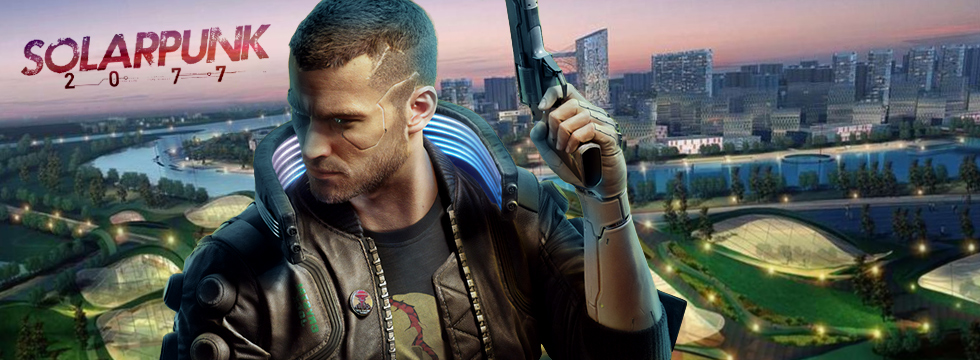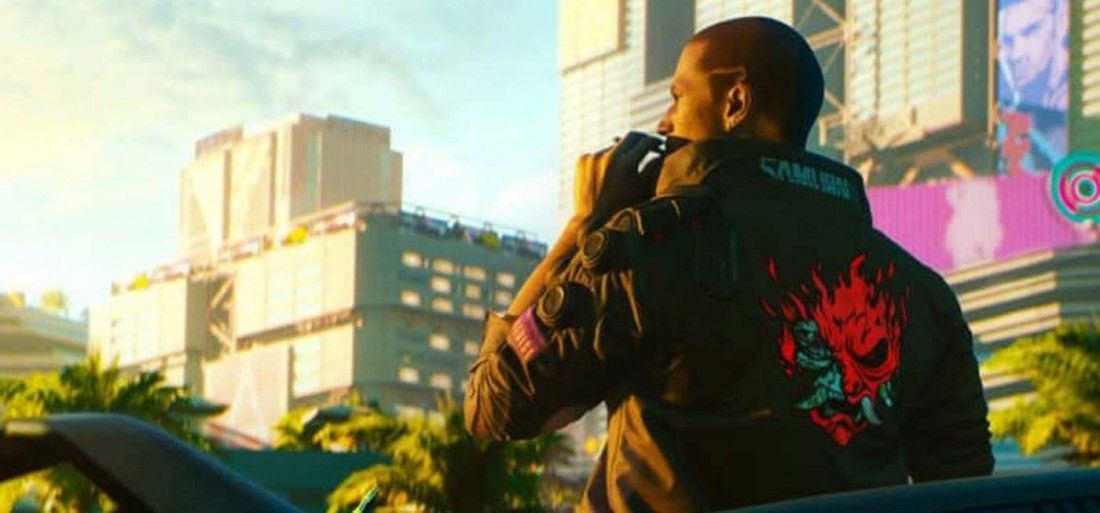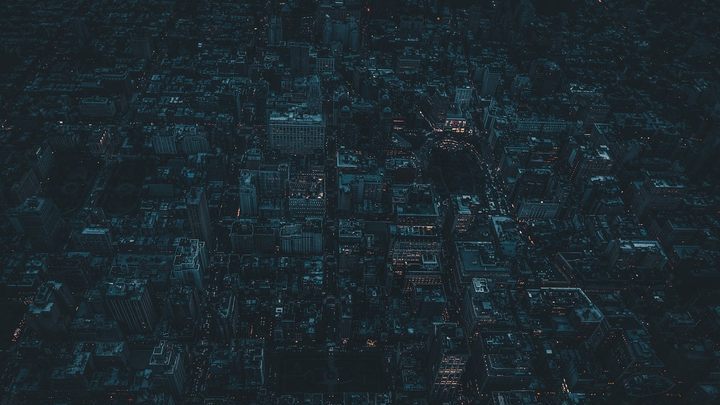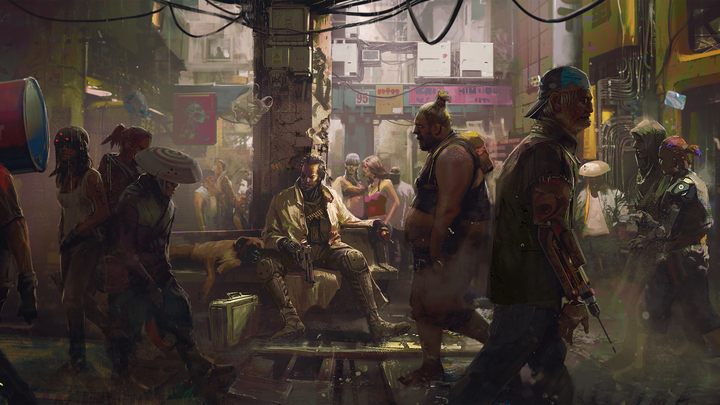Why Cyberpunk 2077 Needs Solarpunk
The developers of The Witcher series create a game about the dark future of our world, in which large corporations rule the masses of degraded people. Should the Polish studio use its gigantic influence to show millions of players a better future?

It’s been raining for three weeks straight. Just before that, snowfall reached levels that wouldn’t be surprising in December; it’s late May. In a few weeks, scorching summer heat is bound to start radiating every corner of the city, which for the rest of the year remains smothered in thick, suffocating smog. Two of the world’s greatest powers have entered a state of trade war, and God only knows whether it isn’t a prelude to something else, something far worse. One of the world’s leading producers of soft-core cybernetic mind extensions is under flak for farming intimate user data. The mainstream media give little attention to it, but entrepreneurs and politicians, intellectuals, and engineers in the Silicon Valley talk of the on-going race for true artificial intelligence. Whoever gets it first, may seize more power you could imagine.
The world’s leading economy chugs 9 million oil barrels every single day. One million kilograms of Carbon Dioxide is released into the atmosphere every second. Powerplants all over the world are struggling to keep up with the population’s frantic, infantile and endless demand for energy. Agreement is as hard to come by as compassion or patience. Public discourse has been largely reduced to a chaotic exchange of slogans supplemented from behind the scenes. The society’s divided. The environment is getting wrecked. The temperature’s rising. The Sun doesn’t care, constantly banging Earth’s surface with dozen petawatts of pure energy. The world hangs on a thread as thin as ever – the question is: how much more can it take?

Um Mundo Sustentavel
Yuval Noah Harari, the author of 21 Lessons for the 21st Century, among other books, claimed that science-fiction is currently the most important literary genre in the world. Sci-fi gives writers the perfect avenue for exploring all possible futures and sending warnings back to us; to fantasize about the consequences of changes that we hardly bother predicting day-to-day, but which have been well underway for years, and might strike sooner than we’d like to expect. And while a good read is a great way to learn about these things, nothing can provide as visceral an experience as image – the motion-picture industry capitalized on that, providing most fertile ground for sci-fi, yielding thousands of pictures that tackled, more or less seriously and diligently, the question of the future.
And much in the same way, video games offer the best avenue for science fiction. Not only can they depict in a vivid and detailed way the consequences of our actions, just like the movies – they also allow the audience to grab the steering wheel, entrusting them with making the decisions, opening the opportunity for a much broader and more comprehensive analysis of our problems.

And, as you can see, the problems are plentiful. But they’ve always been that. The history of mankind is a constant struggle, a never-ending fight for survival. In the past, however, we have fought the world, wild animals, diseases, hunger and disasters. Now we must overcome our own nature. Never before have we had to grapple with our own selves for our own survival. But, so far, we always endured. Resilience is in our DNA, and there’s no shortage of forces in this world which have envisioned a better future, trying to pave the way for us.
Punk for the planet, there’s no other like it
I’m curious to see Cyberpunk 2077’s hypetrain finally start rolling full-power. The Witcher 3: Wild Hunt was promoted with "This world doesn’t need a hero" slogan, but in case of this game, it wouldn’t work. There are few things we can be certain about the upcoming RPG from the creators of The Witcher series, but one thing’s for sure: both our world and the universe conceived by Mike Pondsmith desperately need a hero. An army of heroes would be even better.
CP2077 will sure be brimming with lots of things. I’m looking forward to see what the progression system will be like, whether there will be an incremental gender slider in the character creation, or how the cars will handle. It’s going to be fascinating to go through the Polish team’s interpretation of the somewhat old-school universe. You can obviously expect us, and other media outlets, to let you know all about the character classes available in the game, the major factions, the story outline, and so on and so forth.

Despite that we know practically nothing about the game, even though the first official information about it appeared seven years ago, I would like to indulge into speculation about what can CDPR do to up their game a bit more. To show that video games are not just about frivolous entertainment and shooting things; that the medium as a whole, and the legions of creative people behind it, have something to say. To not only deliver a game of the year, but a game of the generation – which frankly is the only way they could better The Witcher 3, an overall ultimate gaming experience for many. And in order to achieve that, the Reds might resort to Solarpunk.
Cyber, or Solar?
Radical ecologism; disillusionment. Expecting the worst, and hoping for the bearable – that’s roughly what Solarpunk is about. The genre is a fairly recent invention, the term has been circling around the web since around 2008. Since that time, there has been no shortage of various forms of arts – from visual, to prose, to poetry – coming from environmentally-conscious artists from around the globe. Solarpunk doesn’t foresee a utopia, doesn’t pretend things are all honky-dory – rather, it fully recognizes the hazards and challenges of the modern world, admits that if we don’t get our shit together, things will go south faster than you can say “Killing monsters.”
And as such, it’s the perfect vessel for the sort of message CD Projekt RED might want to deliver with Cyberpunk 2077. People from the Warsaw studio know how to tell stories. The Witcher series is full of quaint, small adventures, and grand, world-changing intrigues, with particularly The Wild Hunt setting the new standard of storytelling in games. Also with their previous games, the Reds proved they’re not afraid to make a statement, even if simply by presenting the players with a dilemma, and walking away with their own hands clean.

But didn’t the Warsaw studio already choose their punk?
Yes, indeed. They are working with the Cyberpunk franchise, and the table-top system will sure serve as the main inspiration for the game. Cyber could provide the setting, build the world, define the inhabitants and the inner mechanisms – hardly anyone can imagine the near future without mega corporations, increasing mechanization of labor, or merging of wetware with hardware and cyberware. The problems proposed by Cyber are still very relevant, and they will constitute a major part of the game, that I can tell you.
The room for Solar is elsewhere. Solar could provide answers to these questions and challenges. The game would then be, essentially, an argument between the two visions of future – the dark, dystopian one, where most of the population is reduced to a poverty-ridden, unemployed, drugged and frenzied mass, and the dark, albeit solar-powered one, in which things aren’t so bad after all. This could, in turn, fuel the pivotal conflict of the game – the struggle between greedy mega corporations paired with the oppressive government, and, essentially, 21-century cyber-hippies armed with Kang Tao guns.
And before you say it’s nonsense, try to remember what you though when you first saw the trailer. I’d say that the great majority of people expected a Blade-Runner-style, gritty, neon-lit vision of the Night City. Yet – and the question remains how deliberate it was – the Polish devs opted for some nice, California sunshine – highly unexpected, left-field even, but perhaps also indicative of the fact that Cyberpunk 2077 will be a game that grapples with the themes known from Solarpunk (if you were disappointed with no neons in the trailer, check out this article by my colleague to learn why sunny cyberpunk is ok).
With great punk, comes great responsibility
Indeed, this is the perfect moment for releasing a game like that, and CDPR seems the perfect studio to deliver it. The Warsaw-based team are punks of the industry, not afraid to criticize the strictly profit-oriented, cold and calculated strategies of the biggest studios, showing a middle finger to the appalling practices designed to exploit psychological mechanisms most people aren’t even aware of. With a high-profile solar/cyberpunk game, they could reverse the Orwellian vision of the world, educate instead of indoctrinate, while also letting you shoot things.

This may sound far-fetched and even naive – after all, CDPR is a company; it has shareholders and an executive board, it prepares quarterly financial statements and audits, it has to watch the budget – it has to stay afloat. But there must be a reason why they’ve had a bee in the bonnet about independence and good relations with players. Also, their potential seems to grow exponentially – compare the original Witcher with the Wild Hunt, and you might just be astonished that only eight years separate the two games, with just a single title developed in-between. If they want to keep this momentum with Cyberpunk 2077, the game has to be something more than simply a good, or even excellent, shooter/RPG.
Mike Pondsmith isn’t there to make sure the guns are labelled correctly, too. If you appreciate how strong a statement, even if obscured by the thick lore, hidden underneath the façade of unlikely future, the original table-top system makes about the society – that the word punk wasn’t put in there just for kicks – you will certainly agree that the father of the universe will seize the opportunity to reinforce that statement three decades later.

Taken at face value, Cyberpunk as such is just an off-beat, crazy setting full of people with metal body parts. Deeper down, however, the system is about the human condition, about the relation of the individual with power, about the exploitation of the masses by the ruthless powers that be. It strives to depict – to warn of – the sort of social decay that could be brought with unchecked corporate power and further degradation of the environment.
Here’s hoping
And video games have gotten pretty good at illustrating destruction. Keeping in mind the assumed argument between Cyber and Solar, I would be looking forward for the game to offer two ultimate outcomes: in the first one, the player’s decisions result in an ultimate catastrophe. We get to see the city succumb to an environmental disaster, we’re responsible for the eradication of the entire population. This itself would be a damn strong statement – visualizing the future, in which greedy shortsightedness takes us across the Rubicon, or rather, across the Styx. There’s no turning back, greenhouse heat death is finally upon us.

The Solar ending, on the other hand, would enable the players to establish sustainability in the game world. Political implications aside, the “good” ending would allow the player to tear down the tyranny of corporations, and reorient human endeavors from destruction to harmony. Sounds grand? Well, what are video games for, if not empowering us to do the impossible?
There’s been a lot of wishful thinking poured in this text, and it’s more likely than not that Cyberpunk 2077 will be something entirely else, albeit equally amazing. Bearing in mind CD Projekt RED’s philosophy, the fact they’ve been embracing not only good relations with their fanbase, but also – as of late – made efforts to improve their relations with the employees, and the unexpected sunshine featured in the 2018 E3 trailer, I’d say the chances we’ll get a triple-A, Solarpunk game are more than marginal.